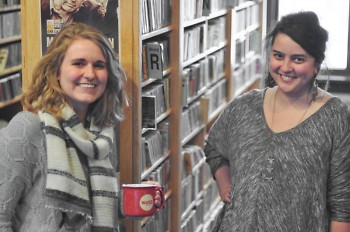With the new year, comes a renewed focus on sharing the under-told stories in our community.
Catalyst Radio, a project of the Grand Rapids Community Media Center (CMC) and a radio show on WYCE 88.1FM, is beginning a new chapter. United around the themes of community issues and social justice, through a lens of media literacy, Catalyst Radio will continue to tell the stories, challenge the dominant narratives and show the strength of our community through the collaborations we build. With its weekly broadcast and podcast, airing every Friday at noon to 12:30 p.m. and podcast to come, each interview will dive into the issues that matter for our community.
Catalyst Radio was established in 2004 to fulfill the mission of creating community through media. The weekly show was started by long-time host Linda Gellasch, who is now the Executive Director of the CMC. By being a platform for justice-oriented work being done in Grand Rapids, Catalyst was meant to be the spark which the name suggests– not only an opportunity for education about issues, but a catalyst for further change and improvements in our community.
The new team of hosts is excited to build upon this legacy and expand this work even deeper and further. With the revamp of Catalyst, it was decided to have a team of hosts to explore the varied and diverse stories from across our community. As was shared on our first episode of the new Catalyst Radio, which came out last week on January 1, each host has a particular focus to bring into the show.
First, there’s Michele Fife. Fife is a wellness expert for WOTV4Women, yoga instructor and animal justice advocate. Covering stories in the community that relate to food and nutrition, holistic health and wellness and animal rights, she will explore how and why these issues matter for ourselves and for our community as a whole.
Next, Jessica Young is going to cover everything from nonprofits to city issues in Grand Rapids. With her current work at Heart of West Michigan United Way and previous work with literacy in Grand Rapids, Young will bring in a breadth of topics, from the movement toward alternative transportation to current programs around hunger and homelessness.
Finally, as you may have guessed, myself- Katie Gordon. My day job with the interfaith community, where I bring the religious, spiritual and secular communities of West Michigan together to emphasize distinct traditions yet shared values, will bring a lens of intersectional diversity to the interviews, and I’m hoping to explore how to make Grand Rapids a more inclusive and equitable community where all can thrive.
Catalyst interviews will not only delve into the issues themselves, but also take a critical media literacy lens.
"[Media literacy] provides a framework to access, analyze, evaluate, create and participate with messages in a variety of forms — from print to video to the Internet,” according to the Center for Media Literacy. The expanded definition goes on, “Media literacy builds an understanding of the role of media in society as well as essential skills of inquiry and self-expression necessary for citizens of a democracy.”
On our episode this coming Friday, January 8, I sit down with Jeff Smith, a community organizer who has advocated for media literacy in our community since he created the Grand Rapids Institute for Information Democracy (GRIID) in 1998. As he discusses, implications of media literacy have profound impacts on the way we consume, filter and use the information we read, hear and see. In GRIID’s words, with media literacy comes “critical thinking skills about how media functions and how it can misinform the public on critical issues like war, race, gender, health, the environment, consumerism and elections.” For more on the key concepts of media literacy, visit GRIID’s resource here.
By sharing stories from the people who live the issues and experiences through their professional or personal lives, Catalyst aspires to provide a narrative that may not be covered by mainstream media, but seeks to promote a deeper and more authentic understanding of that topic in our local community.
Finally, something to look forward to within the first month of this relaunch is that, with the help of WYCE, we are creating a podcast, helping share these stories even more with the greater community. When we discuss a range of issues from refugee resettlement to neighborhood collaboratives, the interviews can be heard on-the-go as well as on the weekly radio broadcast.
We also want to cover the stories you want to learn about. We want to interview the people and the organizations you are most interested in. We want to be a platform for you, the community, and we want to help catalyze improvements for the things that matter in Grand Rapids.
So let us know how to do that. And together, we will revamp Catalyst Radio to create connections and change in our community.
The Rapidian, a program of the 501(c)3 nonprofit Community Media Center, relies on the community’s support to help cover the cost of training reporters and publishing content.
We need your help.
If each of our readers and content creators who values this community platform help support its creation and maintenance, The Rapidian can continue to educate and facilitate a conversation around issues for years to come.
Please support The Rapidian and make a contribution today.

